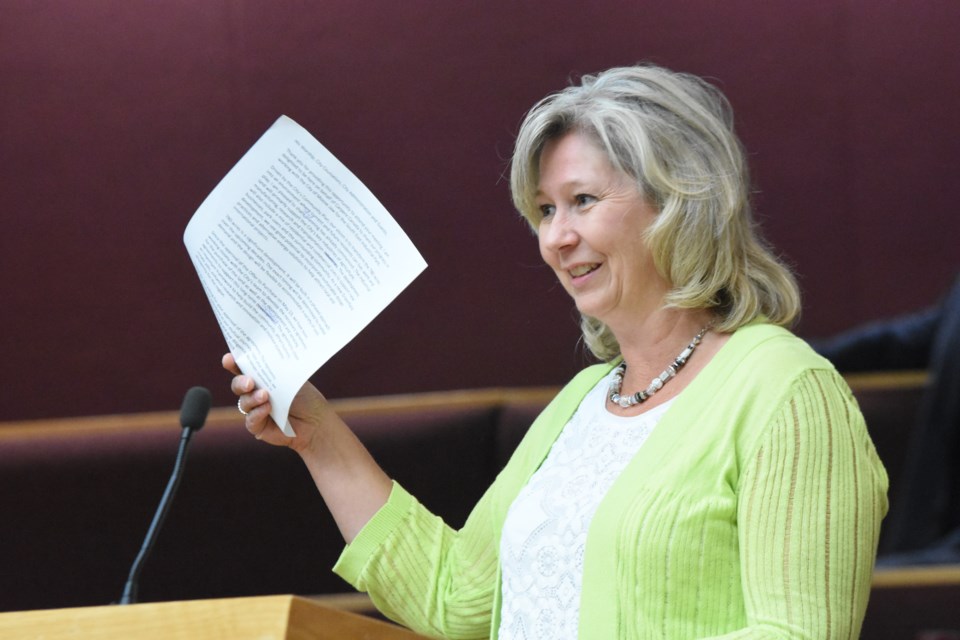The possibility that SaskPower could cancel its project in the South East Industrial Park did not dampen city council’s enthusiasm about the next phase in the park's development.
The municipality and Carpere Canada have reached an important project milestone around the sale of lands in the Industrial Park. During its July 8 regular meeting, council voted 6-1 to approve the purchasing agreement, master development agreement, and servicing agreement for 286.4 hectares (716 acres) of industrial land and 25.6 hectares (64 acres) of residential land that had been negotiated with Carpere.
Coun. Brian Swanson was opposed.
Financial highlights
As part of the agreement:
- Carpere will pay the municipality $7.8 million for the 780 acres;
- The developmental levy fee on the 780 acres, at $49,000 per acre, could generate $38,688,000 for the municipality if Carpere develops the land in the next 10 years;
- The amount of total taxation generated could be $274,153.49;
- The overall net financial benefit to the municipality would be more than $45.8 million.
Following the 10-year time frame, the option is available for the municipality to purchase the land at fair market value. The service agreement indicates work should commence within 12 months of the agreement going into effect and should be completed within 24 months.
The next step is for both parties to move into detailed planning, while working towards the purchase being completed by this fall.
Council discussion
“We’re excited about this partnership with Carpere and are much closer to seeing significant investment in Moose Jaw from beyond our provincial and national borders,” said Mayor Fraser Tolmie. “This is the largest land deal in the City of Moose Jaw’s history, and we’re proud of the work administration has done in the past seven weeks to help finalize these agreement.”
This is a tremendous opportunity to develop more than 700 acres with minimal expense to the municipality, agreed city manager Jim Puffalt. City administration is working with Carpere to find solutions to ensure development occurs.
Carpere COO Rhonda Ekstrom praised the work city administration had done to put together these agreements. She thought the contracts were built on a framework that would stand the test of time. She also thought they would be flexible and accommodating enough to attract businesses.
City administration has been in contact with Carpere about the surprise announcement that SaskPower may halt its proposed natural gas plant in this area, Puffalt told Coun. Scott McMann. Municipal officials spent the morning calling provincial officials to acquire more information about this development.
“It would not be the best if that project does not proceed,” Puffalt said. He added that Carpere would be responsible for developing the land SaskPower would have occupied and not the municipality.
It would be premature to say this project is cancelled, Puffalt reminded Swanson. The provincial government has a desire to provide a base load of power for residents, he continued. Building a natural gas plant might be one way to provide that power since renewable energy is not reliable enough yet.
If SaskPower does drop out, city hall can renegotiate with Carpere about development — particularly water and sewer —since the contracts are flexible, added Puffalt.
“The decision by the federal government was a surprise to a lot of provincial ministers. We fought extremely hard to get SaskPower to get that plant here and we’ll fight very hard to make sure it goes through,” said Tolmie.
Council later voted 6-0 to approve the Carpere Development Levy Exemption Bylaw, which ensures the project can proceed smoothly. Swanson stepped out of the room during the vote, thereby allowing the bylaw amendment to pass that evening.
According to the Canadian Press, the federal government has finalized standards for a carbon tax on heavy industrial emitters. This means any combined-cycle natural gas plant would have to produce zero emissions by 2030, or pay up.
Saskatchewan’s environment minister, Dustin Duncan, indicated the utility needs to look at how cost-effective the plant would be to operate under the change.
The next regular council meeting is July 22.




